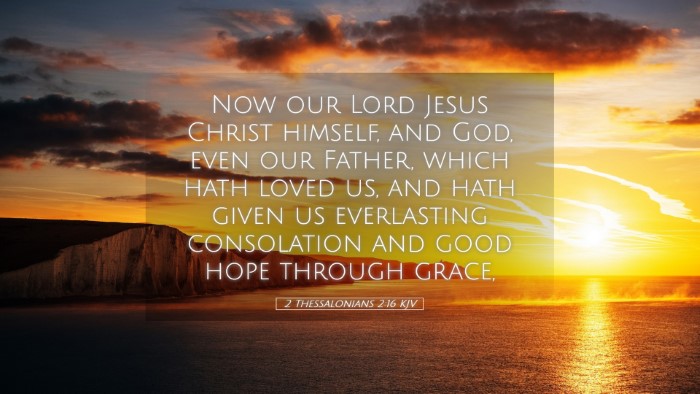Commentary on 2 Thessalonians 2:16
2 Thessalonians 2:16 states: "Now our Lord Jesus Christ himself, and God, even our Father, which hath loved us, and hath given us everlasting consolation and good hope through grace."
Introduction
In this verse, the Apostle Paul reaches a moment of profound pastoral reassurance. He intertwines the role of Christ and the Father to encourage the Thessalonian believers in the face of persecution and confusion surrounding the day of the Lord. This verse encapsulates fundamental Christian themes of divine love, hope, and grace.
God's Love and Jesus' Role
Matthew Henry notes the importance of acknowledging both Jesus Christ and God the Father in this verse. He emphasizes that their joint contribution to our salvation is essential.
- Christ's Authority: Paul reaffirms the lordship of Jesus, underscoring His authority in the life of believers.
- The Father's Love: God's love is not just a sentiment but a powerful force that undergirds the believer's experience of grace and hope.
Albert Barnes enriches this understanding by stating that the acknowledgment of the love between Jesus and the Father is critical. This love is central to the consolation received by believers. Through Christ, one can comprehend the deep affection that the Father has for humanity.
Everlasting Consolation
Paul speaks of "everlasting consolation," which points to the eternal comfort the believer receives from God. Adam Clarke elaborates that this comfort stands in stark contrast to the temporary pleasures and reassurances of the world.
- Permanence: This consolation is everlasting—unlike ephemeral peace offered by worldly assurances.
- God’s Promise: The promise of consolation is rooted in God's unwavering nature and His eternal covenant with His people.
Good Hope Through Grace
The phrase "good hope through grace" speaks to the transformative power of grace in the life of believers. Matthew Henry emphasizes that hope in Christ is based on His grace, not human effort or merit.
- Definition of Hope: Biblical hope is not mere wishful thinking, but a confident expectation rooted in God's promises.
- Grace as Foundation: The grace of God is the foundation of this hope, assuring us of our salvation and future glory.
Clarke points out that the believer's hope is firmly anchored in the grace manifested through Christ, prompting a life filled with peace and assurance.
Theological Implications
This single verse carries profound theological implications that echo throughout Christian doctrine:
- Trinitarian Doctrine: The mention of both Jesus Christ and God the Father reflects the Christian understanding of the Trinity, showcasing the cooperative work within the Godhead for the believer's welfare.
- Assurance of Salvation: The verse provides reassurance of eternal life beginning from the present moment, reminding believers of the full scope of their salvation—past, present, and future.
Practical Applications
For pastors, students, and theologians, this verse encourages a few practical applications:
- Pastoral Care: Pastors should draw strength from this assurance while ministering to congregants who feel hopeless or alone.
- Biblical Encouragement: Students and scholars can utilize this for greater understanding in texts discussing comfort, hope, and grace.
- Evangelism: This message of "everlasting consolation" should inspire evangelism, pointing to the hope that exists in accepting Christ's offer of grace.
Conclusion
2 Thessalonians 2:16 encapsulates key elements of the Christian faith: the inseparable love of the Father and Son, the everlasting consolation that believers receive, and the hope anchored in grace. For those studying the Scriptures and for leaders of the faith community, these insights offer profound truths that provide comfort, inspire worship, and encourage a life of faith-filled expectancy.


